|
1.
CENTRAL/ WEST AFRICA
Log market stable amid steady demand
The overall price stability in the market continued through mid-February, resulting in unchanged prices. The strength
in demand remains while producers focus on keeping up the regular shipment schedules for buyers in China and
India. European demand has also held steady due to the relatively mild winter weather across mainland Europe and
the UK. Because of the steady demand it appears that most producers are not actively looking for new markets. The
regular business built up over the past two or three years at moderated rising prices led to a rationalization of logging
activities. During that period, business was more subject to weather factors than to vagaries in
market demand. In fact, the heavier rains in 2006 and early 2007 in many areas
have forced price rises due to supply shortages, a pattern seen recently in Malaysia and Indonesia. For the current
quarter, Chinese New Year celebrations beginning in Asia will undoubtedly impact favourably West African shippers
as Far East supply dries up temporarily.
Sawnwood market mirror log market conditions
The sawn lumber situation mirrors that for logs with prices very firm and unchanged, and demand showing every sign
of stability through the end of the first quarter. Reports from both West Africa and Far East are of relatively quiet
market conditions. Buyers appear not to be pressing for supply while producers are not pushing for new business,
as the market remains very active with existing contracts.
UNSC mulls imposing trade sanctions on DR Congo
A Group of Experts (GE) have recommended to the UN Security Council (UNSC)
urgent
intervention against all forms of illegal natural resource exploitation is
required.
The GE advised that ¡ˇăthe existing laws of the Democratic Republic of the Congo, particularly the regulations
governing natural resources and their orderly exploitation, be used as a baseline for a new sanctions regime¡ˇŔ. The
report says that unlicensed artisan miners and middlemen, buyers and traders that are
engaged in fraudulent activities and members of the national police and militaries who
extort fees as well as companies that have engaged in irregular payments to government officials are all involved
in the illegal exploitation of resources. Sanctions could be imposed initially on illegal trade of some
minerals and, at a later stage, on other commodities such as timber or petroleum.
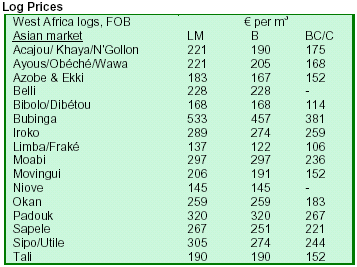
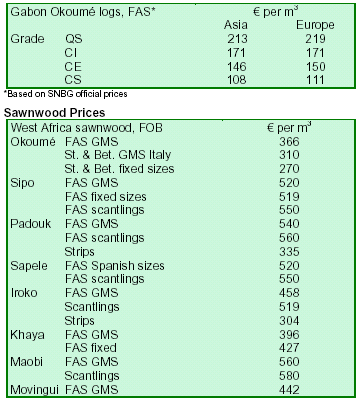
2. GHANA
Forestry Commission appoints acting Chief Executive
The former Executive Director of the Timber Industry Development Division (TIDD) of the Forestry
Commission (FC) in Takoradi, Dr. Alhassan N Attah, was appointed as acting
FC's Chief Executive in Accra last
December. The appointment followed the retirement of Mr. John Otoo, former Chief Executive.
FC readies for competitive bidding on plantation timber
An estimated 116,000 m3 of plantation timber is expected to be sold to prospective timber
companies this year under the National Competitive Bidding for Timber Plantation.
The plantation was established by FC's Forest Services Division (FSD). FC's Timber Rights Administrator,
Raphael Yeboah, informed that, this time, bidding companies would be required to make a 50% down
payment of the bid price in order to avoid previous situations where many companies failed to pay. The
remaining 50% of the bid price would be paid in two equal instalments over a one-year contract period. Successful
companies would also be expected to deposit a bank guarantee against the 50% deferred payment at the time of
signing the contract.
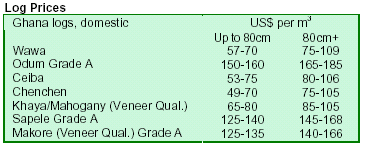
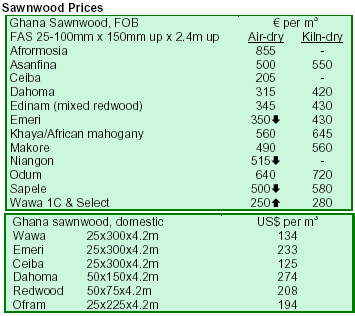
3.
MALAYSIA
Moderate price increases ahead of Chinese New Year
Businesses, including the timber sector in Malaysia, begin to wind down for the annual Chinese Lunar New Year
celebrations that start on 18 February. Prices for sawntimber and some added-value products remained
stable while those for logs, plywood and rubberwood products showed moderate increases. With rubber trees in
most part of Southeast Asia going into the wintering phase, prices of natural latex has hit record prices
worldwide, driving up the price of rubberwood in the process. Prices of rubberwood are unlikely to ease until
mid-2007, according to some analysts.
EU offers subsidies for certification of legality
Timber companies in Malaysia can get subsidies from an EU grant to obtain certification that their timber is legally
sourced for the EU market. Andy Roby of the UK Timber Trade Federation (TTF) said the grant would subsidize
72% of the cost of obtaining certification. He said the subsidy was available to timber suppliers through an EU
grant, which total funds amounted to .3.5 million. He
added that although the scheme had been introduced in Malaysia for about a year already, some of the companies
in Peninsular Malaysia knew about but not many in Sarawak were aware of it.
Malaysia braces for the largest furniture fair ever
Preparations for the Malaysian International Furniture Fair (MIFF), to be held on 6-10 March 2007, are well
underway. The thirteen edition will be the largest on record. It will be held simultaneously in three different
venues, namely the Putra World Trade Centre (PWTC), the Kuala Lumpur Convention Centre (KLCC) and the
MATRADE Exhibition and Convention Centre (MECC). With the introduction of a third venue, the total size of the
fair grows to 75,000 m2. The introduction of the venue was in response to a growing influx of foreign exhibitors.
Countries sign MoU to create ¡ˇăHeart of Borneo¡ˇŔ
Malaysia, Indonesia and Brunei have signed a Memorandum of Understanding (MoU) on forest
conservation in their common border in Borneo. A declaration dubbed the ¡ˇăHeart of Borneo¡ˇŔ (HoB) was
signed in Bali and intends to enhance cooperation in the field beyond the countries¡¯ borders, widen the network of
protected areas, maintain forestry links and ensure sustainable use of land. The joined forest area among the
countries covers 22.09 million ha, 31% of the Borneo Island. The HoB Declaration is said to have received the
support of various quarters, including the WWF and EU.
Malaysia imposes anti-dumping duty on Indonesian paper
The Malaysian government has imposed a temporary antidumping import duty of between 3.4% and 13.53% on
Indonesian paper products made from corrugating medium paper. The decision was made as of 24 December 2006
following an investigation of a complaint filed by the Malaysian Pulp and Paper Manufacturers Association. In
addition to Indonesia, other countries under investigation
include Australia, China, the EU, Japan, Korea, the Philippines, and Thailand. The Malaysian
Ministry of Trade and International Industry stated that five Indonesian companies (PT Indah Kiat Pulp & Paper
Tbk., PT Fajar Surya Wisesa Tbk., PT Jaya Kertas Tbk., PT Dayasempurna Cellulosatama and PT Pakerin) were
proved to have carried out dumping activities.
Malaysian ringgit surpasses key level
The ringgit rose to a fresh nine-year high against the US dollar recently, as foreigners continued to pour money into
Malaysia's stock market, swamping central-bank ringgit
sales valued at an estimated $1.5 billion that were aimed at slowing the
currency's rise. The dollar traded at 3.49
ringgit, below the key level of 3.5 ringgit for the first time since November 1997, despite the
Malaysian central bank's apparent heavy market intervention, which has grown in scale during the past few weeks.
Economists say the ringgit will continue to appreciate despite signs from the central bank that it is increasingly
uncomfortable with the speed of the currency's rise. Supporting the
ringgit's rise is an inflow of foreign
money, with some saying Malaysia is benefiting from funds that might otherwise have gone to Thailand before
Thailand acted to curb speculative flows.
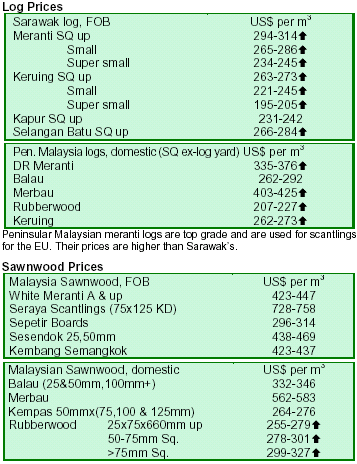
4.
INDONESIA
Prices unchanged after floods engulf Jakarta
Prices for timber products, except plywood, were unchanged in early February after the worst flooding in
five years hit Jakarta recently. Residents and businesses were cut off from fresh water and electricity. Businesses in
Jakarta, which account for at least one-third of the nation's GDP, are still shut. Damages to the Indonesian economy
were estimated at 4.1-4.3 billion rupiah. This is a major setback for Indonesian timber products exporters as
demand has been strong.
Indonesian exporters appeal to government and importers
Access to Tanjung Priok, the main overseas shipping port, was still cut-off by floods. Ports in other parts of Indonesia
are processing export documentations manually as data transfer to relevant government agencies in Jakarta
remains offline. Indonesian exporters are appealing to the government for assistance to avoid penalties imposed by
foreign importers over exports delay. They have also appealed to importers not to shift their businesses
elsewhere.
Stockists of building material (e.g. plywood and cement) in Jakarta are facing serious challenges as businesses
assess the damages. Some observers estimated that it would take at least three years for Jakarta to recover from
the recent flooding.
Indonesia eyes financing of small-holders forests
The Indonesian government is planning to establish a Forest Development Financing Company (BUPPH), which
would finance development of 5.4 million ha of small-holders forests with 9.7 trillion rupiah from the
Reforestation Fund's Forest development Account (DR RPH). Borrowers may apply for the loan as individuals or
as business group, with the understanding that loan is for a seven-year planting cycle.
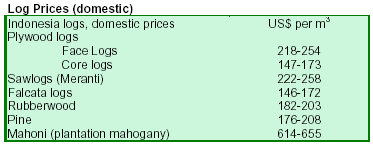
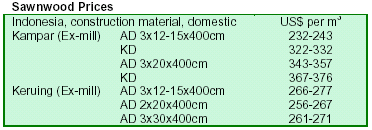
5.
MYANMAR
Teak logs begin the year with strong price hikes
January tender/sealed tender prices for teak grades opened the year at very strong levels compared with previous
months. Except for SG5, average price for all other grades are significantly higher. Such high prices are
mainly due to supply and demand imbalances. Most buyers hope that the quantity, quality and prices remain
compatible to sustain a healthy market condition.
Gurjan and other species active in tender sales
Pyinkado is still experiencing the negative after-effects of the price increase while the gurjan market remains active.
There were some log species offered in the sealed tender on 26 January, including gurjan (both kanyin and in logs,
Dipterocarpus spp), htaukkyant (Terminalia tomentosa), ye-ma-ne (Gmelina arborea), thinwin (Milletia
pendula), padauk (Pterocarpus macrocarpus) and roughly hewn
ta-ma-lan (Dalbergia oliveri). Gurjan, in and htaukkyant logs are sold in Yangon and the rest ex-site in
Kinta, Magway, Monywa and Mandalay, in central Myanmar. The following table shows bids made for these logs.
Different grades, assorted and export-rejection (ER) grades for padauk while export quality and ER for other
species. In the hardwood trade in Myanmar, size seems to be more important than other factors.
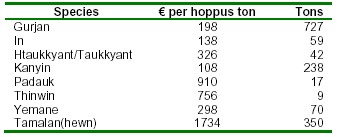
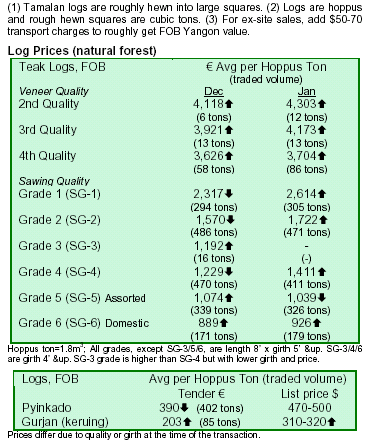
6. PAPUA
NEW GUINEA
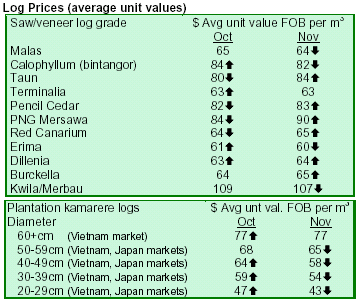
7. BRAZIL
Parˇ§¢ sees declining exports in 2006
Exports of solid-wood products from the Northern state of Parˇ§¢ fell 6.8% to 994,803 tons but surged 12.7% to $645
million in 2006. The contraction in export volume was particularly critical in tropical plywood (down 28%),
wood frames (down 21%) and charcoal (down 56%). Exports of sawnwood, formerly the main export product,
dropped 11.8% in volume but rose 5.4% in value due to higher prices and despite an unfavourable exchange rate.
In spite of the increase in export value, the solid-wood sector continues to be affected by the continuous
depreciation of the US dollar against the Brazilian real.
Elliotis plywood producers push prices slightly up
Brazilian manufacturers of elliotis pine plywood have managed to raise some prices in recent weeks, something which had been planned for a long period of time, Euwid reported. Prices have risen by around $15 per m3 since
December. Minor mark-ups announced earlier had failed to materialise. Five-ply 9mm panels have
achieved slightly stronger price hikes. This range is currently fetching $300-310 per m3 on average, up $20-30 per m3 from the
fourth quarter of 2006. The stronger leaps in prices of 9mm panels were due to a scale back in production of thin
panels. Furthermore, manufacturers of thin plywood panels continue to face log and veneer supply
problems. In particular, 2mm veneers, needed for the manufacturing of five-ply 9mm plywood, are short in supply. Due to the
limited availability of five-ply 9mm plywood, some buyers have now switched to three-ply plywood which
costs $285-290 per m3 and is far more easily available.
Overall availability of elliotis plywood, except five-ply 9mm plywood, is considered to be relatively
unproblematic. Demand from European buyers has also improved recently. In the fourth quarter, orders against the
EU duty-free quota had been comparatively constant. An expected revival in October and November failed to
materialise across Europe, but sales rose in January. Up until now, the duty-free quota is being exhausted at an
average speed. By the end of January, roughly one-third of the total volume of 650,000 m3 had been booked.
Large-scale monitored harvesting planned for the Amazon
A recent government plan will allow large-scale forest harvesting in 2007, the first time in the Brazilian Amazon.
The monitoring of these operations by the government is believed to compensate for the risk of increasing
deforestation. In an attempt to create the first coherent, efficient forest policy for the country, the government will
start to auction rights of forest harvesting in large extensions of the Amazon rainforest. Under the plan,
successful bidders will not receive land rights or the right to explore other resources besides timber. The plan is also
expected to help reducing pressure on land properties in the Amazon. The plan is considered a good alternative in
places where deforestation is high but it could stimulate predatory forces in pristine areas. According to some
analysts, there is a consensus that the system is an improvement compared to the current situation of
minimum control. However, the plan will only reach its objective if human and financial resources are allocated
and fully available, mostly for monitoring and law enforcement.
Brazil plans national forest inventory in 2007
The Brazilian Ministry of Environment plans to carry out a national forest inventory to survey the natural and planted
forest cover. The inventory would help to identify current and potential forest uses. The forest inventory will serve as
a basic tool for the preservation of natural forests that
cover almost 50% of the Brazilian territory. The results of the inventory will be used, for instance, to recover
degraded forestland and guide the expansion of planted forest areas. The inventory will start in 2007 and would be
completed in 3-4 years with updates taking place every five years. After the approval of the Public Forest
Management Law in 2006, the inventory will mark a new phase on the discussion of forest issues with planning based on actual information.
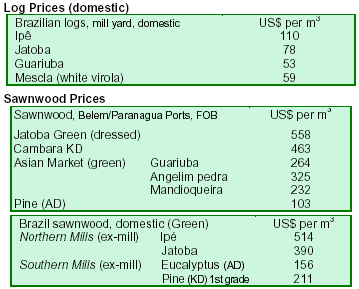
8. PERU
Iquitos boosts the number of export timber species
Peruvian lumber is exported through two ports: Callao Port, in Lima on the Peruvian Pacific coast, and Iquitos
Port on the Amazon River, in the heart of the Peruvian Amazon. About 38.89 thousand board feet (mbf) of
sawnwood, worth $24.5 million, were exported from Iquitos in 2006. Most of this sawnwood (82% of the
volume) went to Mexico and the remaining to USA. Naviera Maynas S.A., a Peruvian cargo ship, carried all
the volume exported.
The number of lumber exporting companies in Iquitos rose from 32 in 2005 to 39 in 2006. The installed capacity of
processing plants has been rapidly expanding, boosting the production of sawnwood and added-value timber products.
As a result, overseas orders for wood friezes, decking and flooring have increased. The number of lumber species
exported from Iquitos rose from 11 to 18, including cumala (78.9% of the exports), lupuna (8.9%), cedro
(5.6%) and marupa (4.4%).
Peruvian wood products exports reach record level
According to the Wood Committee of the Peruvian Exporters Association (ADEX),
Peru's exports of timber
products amounted to $198.4 million in Jan-Nov 2006, up 33% from the same period in 2005. It is estimated that
exports of these products could reach $214 million in 2006, a record figure in the
country's sector. Sawnwood
was the main export product (54.7% of total exports), followed by semi-manufactured products (24%), plywood,
furniture components (7.1%), veneers and wood
manufactures.
Peru has 150 sawmill plants, ten plywood and veneer plants, one particleboard plant and a number of flooring
and furniture plants in operation. According to ADEX, plants are gradually expanding their installed capacity and
technologic level. The number of wood exporting companies rose from 650 in 2005 to 722 in 2006, spurred
by growing demand for forest products in the international market. European, Asian and Mexican groups have sealed
strategic alliances with Peruvian entrepreneurs. ADEX forecasts that exports will surge a further 20% in 2007.
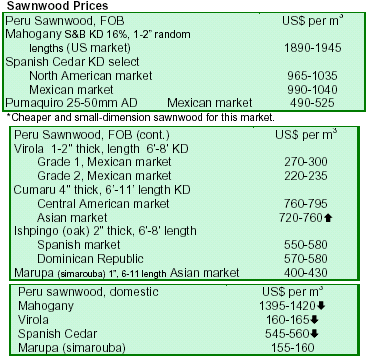
9. BOLIVIA
US imports mainly added-value products from Bolivia
Bolivia's wood products exports totaled an estimated $95 million in 2006. The USA was the main market,
accounting for 45% of the exports, followed by China (9%) while 50 more countries
accounted for the balance. About two-thirds of the export value to the USA were
added-value products while the balance was sawnwood. In contrast, China imported mainly sawnwood. About 70
timber species were exported in 2006, including oak, mahogany, mara macho (Cedrelinga
catenaeformis), Spanish cedar and morado (Machaerium scleroxylon Tul). Some lesser known species are being increasingly
exported, including almendrillo (Dipteryx odorata), curupaˇ§² (Anadenanthera colubrine), tajibo (ipe), quina
quina (Santos mahogany), palo marˇ§ªa (Calophyllum
brasiliense Cambess) and paquio (Hymenea courbaril L).

10. Guatemala

11.
Guyana
Tigerwood and Iwokrama in joint venture
Tigerwood Guyana Incorporated (TGI) has joined forces with the Iwokrama Centre, which manages over 400,000
ha of Iwokrama Forest in central Guyana, to show how tropical forests can be
sustainably used to provide benefits to local, national and international communities, TTJ
informed. The new company, Iwokrama Sustainable Timber Incorporated, says it will ensure that no logs are
exported from the area, and that value-added activities are undertaken, including processing timber into hewn wood,creating more local employment.
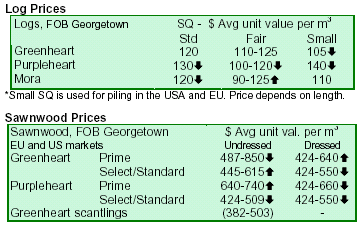
|